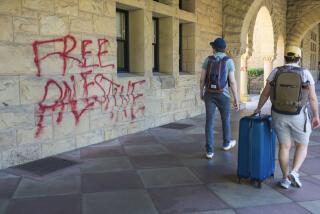Raid Reignites Palestinian Resentment of Israel
- Share via
NABLUS, West Bank — The hundreds of police officers who stormed a rally at An Najah University over the weekend were very clearly Palestinians under the authority of Yasser Arafat. But the students striking in protest here Monday blamed the raid on Israeli Prime Minister Shimon Peres.
Peres is pushing Arafat to crack down on the militant Islamic movement Hamas for the four recent suicide bombings that killed 62 people in Israel, the students said, so Arafat is cracking down on the university, which he considers a Hamas stronghold.
“You have to ask who this action serves,” said Omar Dhaher, a 20-year-old engineering student. “Well, it is against us and it serves Israel. We need the Palestinian Authority to support us, not to enter our university and practice violence against students.”
A month ago, Palestinians across the West Bank and Gaza Strip lashed out at Hamas for the suicide bombings, saying the violence threatened peace negotiations with Israel.
Now, after police raids, Israel’s destruction of the homes of suicide bombers, the Israeli closure of the West Bank and Gaza and other measures, Palestinians have forgotten about Hamas’ bombs and are once again directing their anger at Israel.
Faced with upcoming elections, Peres is punishing all Palestinian supporters of peace for the acts of a few violent opponents, they say. As a result, life under the autonomous Palestinian Authority currently looks a lot like life under the Israeli occupation.
The growing anger apparently has not yet turned into outright opposition to the peace process, as most Palestinians still want to go ahead with negotiations for a final peace agreement that are supposed to begin in May. But the frustration appears to be eroding support for Israel’s partner in peace--Arafat.
The Palestinian leader is perceived to be doing Israel’s dirty work, and his actions are causing fear of civil strife among Palestinians.
“People are in a state of shock because our own police attacked the students in the university,” said Zuhair Dubie, editor of the weekly newspaper the Nablus. “I view this as a very dangerous step. The Israelis are pressuring the Palestinian Authority to do this, and the Palestinian Authority is pressuring the people. But we’re solving a problem with a problem, and the most dangerous problem would be internal conflict.”
*
Since the bombings, Arafat has rounded up hundreds of suspected Islamic militants, under pressure from Israel and the United States to break up Hamas’ political wing and social-welfare structure as well as its military wing.
The rally at An Najah on Saturday was held to demand the release of scores of Nablus students and professors who are among those detained by Palestinian police.
While Arafat’s Fatah organization has the biggest bloc of support on campus, Hamas controls the university’s student council through an alliance with another group that opposes the Israeli-Palestinian peace accords. Political observers believe Arafat was trying to send a warning to Hamas activists with the raid.
According to the students, police violated an unwritten rule against entering the universities--they said Israel never sent troops into An Najah during the occupation--and broke up the rally by firing bullets into the air, using tear gas and clubbing students. Several were hospitalized.
*
The action came on the heels of Israel’s arrest last week of about 400 Palestinian students at Birzeit University, in a West Bank area still under Israeli control. That was the largest Israeli police roundup since the signing of the first peace accord, in September 1993.
On Monday, about 2,000 Birzeit University students demonstrated outside the police station there in support of their fellow students from Nablus. After the rally, some of the protesters threw rocks from an overpass at Israeli cars, provoking a clash with Israeli troops, who fired tear gas to disperse the crowd.
In another demonstration at the main Israel-Gaza border crossing, about 200 Palestinian children protested the closure, carrying olive branches and signs reading “Please allow my dad to work.”
After the current wave of suicide bombings began Feb. 25, Israel sealed off the West Bank and Gaza, preventing about 60,000 Palestinians from entering Israel to work each day and blocking trade between Israel and the Palestinians.
Israeli officials on Monday said they will ease the ban on workers to let 3,000 Gazans work on farms in Israel’s Negev Desert near Gaza. All of the workers must be over the age of 45 and married with families--a category that Israel believes reduces the security risk.
The economic impact of the closure has been devastating for most Palestinian businesses and families. While most families have less money to spend, the cost of basic foods has shot up by as much as 500%, with supplies limited by the closure.
All of this adds to the anger and frustration of the striking students at An Najah University.
“Maybe we have to go back and rethink this peace process,” said Bilal Duquate, a longtime Arafat supporter. “Food and security are our priorities. If we don’t have this, we don’t have anything.”
More to Read
Sign up for Essential California
The most important California stories and recommendations in your inbox every morning.
You may occasionally receive promotional content from the Los Angeles Times.













